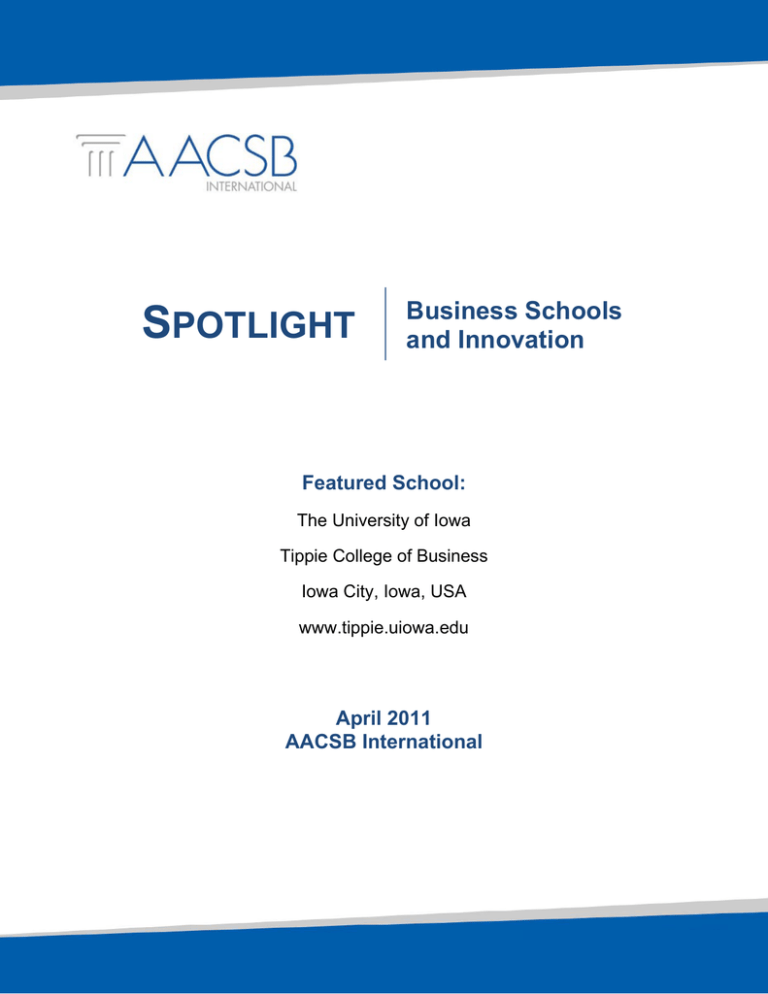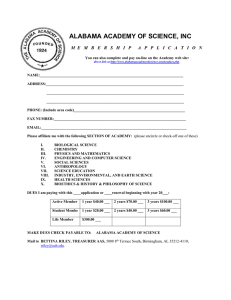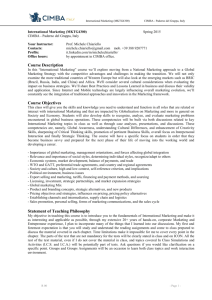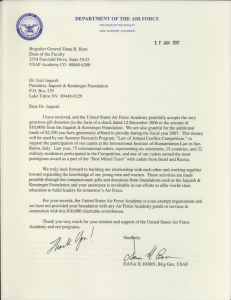
SPOTLIGHT
Business Schools
and Innovation
Featured School:
The University of Iowa
Tippie College of Business
Iowa City, Iowa, USA
www.tippie.uiowa.edu
April 2011
AACSB International
SPOTLIGHT | Business Schools & Innovation
Tippie College of Business, SI Career Academy | 2
The Strategic Innovation Career Academy
One prominent challenge for firms and other organizations is to link their operations with the strategic side
of innovation. At the University of Iowa’s Tippie School of Management, the belief that business schools
could play a role in helping firms to address this challenge prompted the creation of the Strategic
Innovation (SI) Career Academy. At Tippie, academic learning and professional experience are combined
in an MBA curriculum that aims to prepare students with skills that will help them to excel in and become
experts of their field. These efforts are coordinated and led by three “career academies”—one each for
marketing, finance, and strategic innovation—which offer coursework, electives, professional
development, and projects that coincide with their related career paths. In the Fall semester of their first
year, Tippie MBA students choose which of the three courses of study they will pursue.
As recalled by Barry Thomas, Faculty Director of the SI Career Academy, the Career Academies are the
result of an effort launched five years ago to redesign Tippie’s MBA program to better prepare its students
for the rapidly changing world. After a number of market surveys and discussion with stakeholders,
administrators and faculty members recognized that professional awareness and leadership skills
seemed to be an area that needed significant improvement; in the classroom students performed well, but
their skills outside the classroom needed tweaking. While Tippie was already equipped with strong faculty
and curricula, the Career Academies were established to offer an administrative structure that would
foster students’ expertise in professional development and fluency in their chosen field. To do so, the
Academies offer students the opportunity to participate in tours and trips, invite speakers, facilitate
discussions, as well as guide students by providing broader exposure to areas of interest in order to help
develop their contextual understanding of the discipline.
The SI Career Academy was the third career academy to be implemented at the Tippie School. As
members of the business community served by the school began voicing their aspirations to better
harness innovation within their companies, Tippie’s faculty and administrators felt that the school was well
positioned to respond. Over time, faculty at the school had developed research and teaching
competencies in areas related to strategic innovation, including process improvement, operations
management, change management, and technology commercialization. They sought to use the SI Career
Academy as a way to organize their knowledge in these areas in support of a course of study that would
educate students for careers in which they would need to think strategically, utilize innovation, and strive
for continuous improvement within operations.
© AACSB International. All Rights Reserved.
SPOTLIGHT | Business Schools & Innovation
Tippie College of Business, SI Career Academy | 3
The Academy’s Structure
The SI Career Academy’s first class entered in the Fall of 2009, and will complete the program in Spring
of 2011. Since then, the Academy has maintained a commendable track record with its three-part
emphasis on attention to the core curriculum, electives, and experiential learning for full-time MBA
students. Of close to 70 MBA students per year (in each graduating class) attending Tippie,
approximately 15-20 are in the SI Career Academy. Students within the SI Career Academy choose
either the Strategic Management and Innovation track or the Process and Operations Excellence track.
Each track has a slightly different focus that builds upon the required foundation courses that all students
in the MBA program take, allowing students to choose the one that coincides with the specific skills
needed for the positions that interest them.
Within the Strategic Management and Innovation (SMI) track, students are prepared to work across
multiple disciplines within a company. The SMI track consists of nine required courses, and students must
also choose three elective courses that are offered within the Strategic Innovation Career Academy or
other areas. Students are required to complete courses like Strategic Management of Technology &
Innovation, Strategic Cost Analysis, and Strategic Management of Change, which focuses on the
development of the people and process skills involved in organizational changes and incorporates an
applied sustainability team project.1 A Technology Commercialization Field Project, which was initially
executed in Fall 2010, provides students with hands-on experience in technology commercialization. SMI
students work with the University of Iowa Research Foundation in developing plans for taking early-stage
technologies to market.2 Students perform a commercial viability assessment of a real-world opportunity
in the form of technology development, either in an academic environment or in the private sector, and
create a plan to "transfer" that technology to the marketplace, and develop a business model and financial
plan. The content students consider and create is assimilated into a business plan, which students
present to simulated venture capitalists.3 Student teams work on case studies, listen to outside speakers,
and have access to successful entrepreneurs.
In the Process and Operations Excellence (POE) track, built on Tippie's expertise in applying Lean
principles, students focus on process and productivity management within their eight required courses
and choice of four electives from within the Academy or other areas. Students in the POE track, for
example, take an introductory course in Business Analytics. They then are required to complete a
Statistical Methods for Process Improvement course that covers data-based management and statistical
process control, as well as a framework for defining quality, determining customer needs, assessing
customer satisfaction, and developing quality measures and standards. They further complete an
Advanced Business Analytics course that covers advanced predictive statistics and prescriptive
mathematical decision making.4 Students also complete a Rapid Continuous Improvement project and a
© AACSB International. All Rights Reserved.
SPOTLIGHT | Business Schools & Innovation
Tippie College of Business, SI Career Academy | 4
Six Sigma Project. Over Spring break in their first year, teams of two to four students are given the
chance to embed themselves within a company’s process improvement team, use Lean methods in
identifying efficiencies, explore company process intricacies, and in so doing complete the Rapid
Continuous Improvement Project.5 In the Fall of their second year, students take on the Six Sigma Project
in which they work with a Six Sigma Black Belt certified employee at a local company, giving them the
opportunity to apply theory from the classroom to the real world.6 Completion of both projects helps
students attain two process improvement certifications: a Six Sigma Green Belt certification and a Lean
certification.
In addition to the mentioned experiential learning course for each track, all MBA students take on a 16week Business Consulting project, facilitated by the Tippie Business Solutions Center (BSC), during their
second semester. Cross-functional student teams, comprising representatives of the three academies,
are led by second year students, develop a project plan, and meet regularly with corporate sponsors.
Students take on the role of consultants and are expected to handle themselves as on-the-job
professionals with clients, BSC directors, colleagues, and supervisors. They learn how real business
works, participate in actual business decisions, and experience the impact of their decisions alongside the
client.7 The BSC brings together this MBA talent to deliver unique solutions to businesses at an affordable
price, backed by extensive research and innovative ideas; clients are also granted the opportunity to "test
drive" these potential hires prior to making internship or full-time hiring decisions.8
Filling a Niche
A noteworthy aspect of the Strategic Innovation Career Academy is its strong attention to mentoring and
coaching. Each academy has a business director who has a background in a related industry; at the SI
Academy this role is filled by Andrew Jetton, who has more than 15 years of industry experience in
strategic development. The business director acts as a mentor and coach for students. Through one-onone meetings with students, the business director helps them to discover their real areas of interest, and
aids their creation of a Personal Development Plan. This action plan serves to improve specific skills
through a personalized assessment followed by coaching, planning, targeted development activities, and
reassessment.9 Additionally, the business director works in collaboration with the faculty director to make
curricular decisions, organize extracurricular activities, and provide other support to the Academy’s
mission as needed.
Thomas and Jetton also emphasize the amount of traction that the SI Academy is receiving within the
business community by integrating two professional certification opportunities in its course of study.
Although all students of the POE track will complete certification, the opportunity to seek certification is
© AACSB International. All Rights Reserved.
SPOTLIGHT | Business Schools & Innovation
Tippie College of Business, SI Career Academy | 5
open to any MBA student who completes the pre-requisite courses. Jetton points out that companies
have been responsive to the opportunity to hire MBA graduates equipped with professional certifications,
as the companies will not need to subsequently invest in this training. Furthermore, by integrating the
certification training within a broader curriculum and learning experience, the school is able to emphasize
complementarities with other knowledge areas such as change management and the need to manage the
process of innovation in a team setting.
Challenges and Expectations
As would be expected with any young endeavor that aims to influence the way business schools promote
innovation in society and industry, the SI Career Academy has evolved as it has faced challenges and
learned from experience. When the MBA curriculum was changed to a modular format, shifting from one
that spanned 16 weeks to one accomplishing the same (if not better) outcomes in only 8 weeks, Faculty
Directors of each of the Career Academies had to think carefully about how to coordinate courses in the
new structure. For Thomas, this task was particularly challenging due to the significant amount of interdepartmental contributions to the SI Career Academy curriculum. Thomas recounts having to engage in
several discussions across the departments’ faculty to consider where best to capture content within the
program curriculum, decide what background knowledge was required for each experiential learning
project in order to determine proper course sequencing.
Jetton notes that a major challenge currently faced by the SI Career Academy concerns a “tools vs.
leadership” question. In other words, how can the Academy complement efforts to provide students with
the right “tools” for making decisions with effective opportunities for students, through interface with the
business community, to develop professionalism and leadership? Providing an opportunity for the right
courses to complement experience can be difficult. From a market perspective, notes Jetton, innovation
relies on more than product development or investments in research and development; core strategic and
operational ability are also essential. The SI Career Academy strives to create a program that drives all
aspects of innovation, focuses on invention as well as execution, and is complex and multidisciplinary like
the environment it is educating students to enter. All the activities also are aimed at reinforcing Tippie’s
connection to a Tier 1 research institution that invests in science and technology, while promoting
entrepreneurship.
Constantly striving for improvements, the SI Career Academy is evolving and looking forward to future
undertakings. In the Spring semester of 2011, the Academy introduced a new Lean Enterprise course
focusing on operations and strategy. The course incorporates insight from business leaders about
overcoming problems and provides students with tangible experiences of what might otherwise be
abstract notions of what a real-world business problem might be, or the “fuzzy stuff,” as Jetton refers to it.
© AACSB International. All Rights Reserved.
SPOTLIGHT | Business Schools & Innovation
Tippie College of Business, SI Career Academy | 6
Both Jetton and Thomas hope to see a growth in the number of students participating in the Academy, as
well as continued modification to the course structure as the faculty members learn from early
experiences. Finding ways to extend outreach to boost Iowa’s reputation as a hub for innovation and
extending the impact of the SI Career Academy beyond MBA students to corporate consumers are both
additional goals that the Academy is pursuing.
Acknowledgements: AACSB International is grateful for the assistance of Dr. Barrett Thomas, Associate
Professor and Faculty Director, MBA Strategic Innovation Career Academy, and Andrew B. Jetton,
Business Director, Strategic Innovation Career Academy.
© AACSB International. All Rights Reserved.
SPOTLIGHT | Business Schools & Innovation
Tippie College of Business, SI Career Academy | 7
End Notes
1
Tippie School of Management Strategic Innovation career Academy (2011), MBA Elective Courses:
Strategic Management of Change web page,
http://tippie.uiowa.edu/fulltimemba/academics/electives.cfm#6T246, accessed on February, 28 2011.
2
Tippie School of Management Strategic Innovation Career Academy (2011). Learn By Doing web page,
http://tippie.uiowa.edu/fulltimemba/academics/strategic-innovation/experiential-learning.cfm, accessed on
February, 25 2010.
3
Tippie School of Management Strategic Innovation Career Academy (2011). MBA Elective Courses:
Commercializing New Technology web page,
http://tippie.uiowa.edu/fulltimemba/academics/electives.cfm#6T256, accessed January 24, 2011.
4
Tippie School of Management Strategic Innovation Career Academy (2011). MBA Elective Courses:
Statistical Methods for Process Improvement web page,
http://tippie.uiowa.edu/fulltimemba/academics/electives.cfm#6K218, accessed on February 28, 2011.
5
Tippie School of Management Strategic Innovation Career Academy (2011). MBA Elective Courses:
Rapid Continuous Improvement web page,
http://tippie.uiowa.edu/fulltimemba/academics/electives.cfm#6K294, accessed January 21, 2011.
6
Tippie School of Management Strategic Innovation Career Academy (2011). MBA Elective Courses: Six
Sigma Project web page, http://tippie.uiowa.edu/fulltimemba/academics/electives.cfm#6K296, accessed
January 21, 2011.
7
Tippie School of Management, University of Iowa (2011). Tippie MBA Business Solutions Center: Our
Approach web page, http://tippie.uiowa.edu/fulltimemba/bsc/approach.cfm, accessed February 28, 2011.
8
Tippie School of Management, University of Iowa (2011). Tippie MBA Business Solutions Center web
page. Electronic Document, http://tippie.uiowa.edu/fulltimemba/bsc/, accessed February 10, 2011.
9
Tippie School of Management, University of Iowa (2011). Your Road Map to Success web page.
Electronic document, http://tippie.uiowa.edu/fulltimemba/leadership/plan.cfm, accessed February 10,
2011.
© AACSB International. All Rights Reserved.






